10 teams who did a lot after spending very little
Some teams have spent huge this summer - but as Matt Gault attests, it’s not always bad to keep things quiet
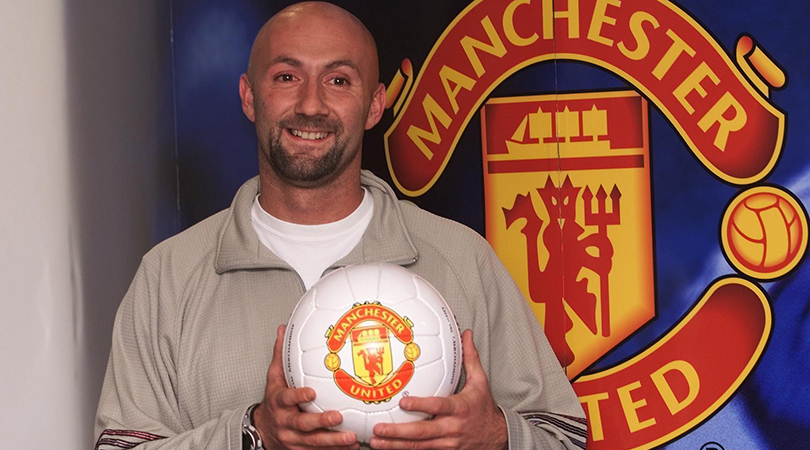
It's not all been big-spending this summer in the Premier League.
While the Manchester clubs have shelled out a combined £180m plus for England's brightest talents, others have chosen to keep the pursestrings tightened. Merseyside has been shrewd, with Liverpool making one signing in Ibrahima Konate and Everton spending under £2m - and a lot of clubs clubs have made just one or two first-team additions.
You don't have to spend big to succeed - as these sides all proved...
1. Manchester United (2000)
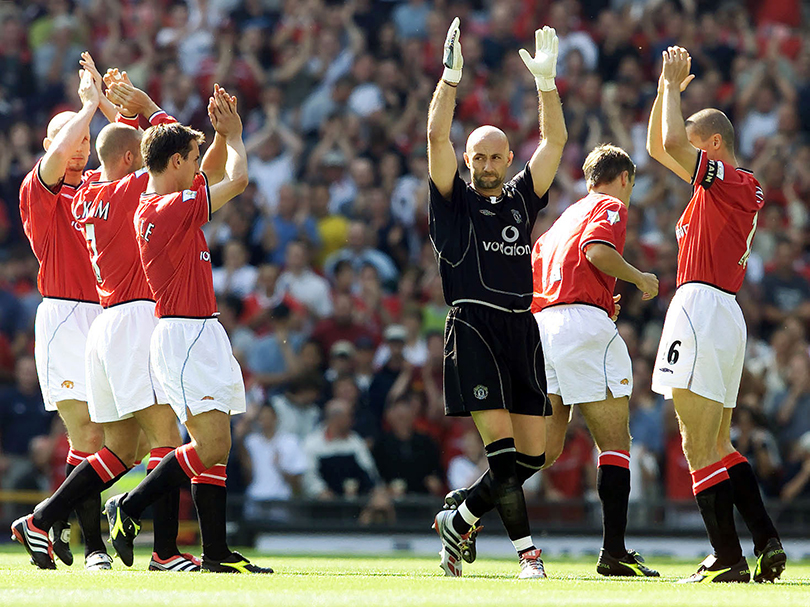
Alex Ferguson’s United had won the league by a record 18 points in 1999/2000, despite the Scot having decided that Mark Bosnich wasn’t the successor to Peter Schmeichel he’d been hoping for. Massimo Taibi, too, had tried and failed – comically so – which led to Fergie’s move for Monaco shot-stopper Fabien Barthez.
Although Barthez’s Premier League career eventually unravelled thanks to a string of mishaps, the Frenchman’s first season between the sticks was a success – he kept 15 clean sheets as United cantered to a third straight title, by 10 points. Barthez certainly played his part, but United’s continued superiority owed much to the fact that Ferguson managed to retain possibly the strongest collection of outfield players the league has ever seen.
It couldn’t last forever, of course. Jaap Stam left for Lazio the following summer and United’s defence collapsed, a move that loosened their grip on the trophy as Arsenal replaced them at the summit.
2. Chelsea (2009)
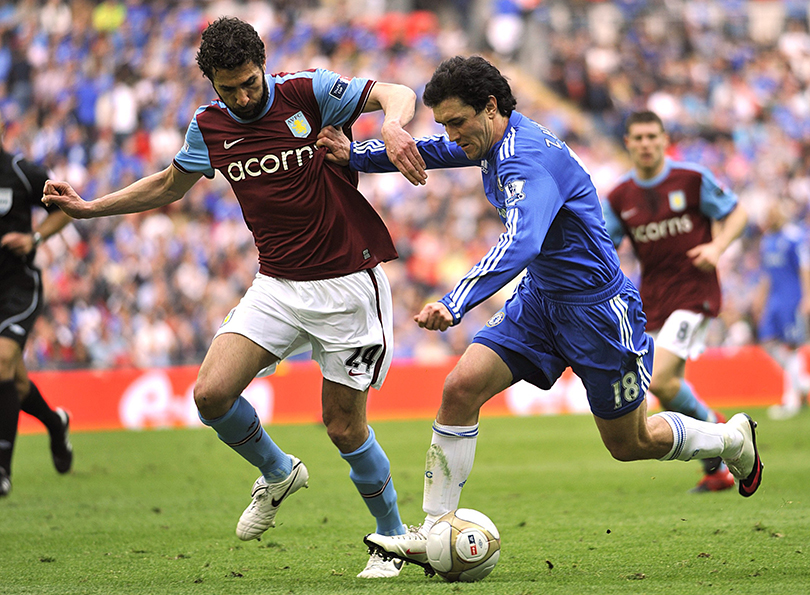
Carlo Ancelotti’s appointment at Chelsea didn’t bring with it the kind of wholesale changes that accompanied Jose Mourinho’s arrival in 2004. Instead, the unflappable Italian went about improving Chelsea’s style of play ahead of assaulting the transfer market.
Get FourFourTwo Newsletter
The best features, fun and footballing quizzes, straight to your inbox every week.
The Blues signed Yuri Zhirkov (£18m), Daniel Sturridge (£6.5m), Nemanja Matic (£1.5m) and Ross Turnbull (free), but it was Ancelotti’s tactical flexibility which led to the most successful domestic season in club history. The 4-4-2 diamond fashioned by his predecessors had been sussed by Chelsea’s opponents, so Ancelotti taught his team how to operate in a 4-3-2-1, 4-3-3 and 4-2-3-1.
The results spoke for themselves. Ancelotti allowed his players to express themselves on the pitch; Didier Drogba scored 29 league goals, while Frank Lampard and Florent Malouda produced their finest form yet.
Chelsea went on to pip United to the title, scoring 103 goals in the process, before clinching the FA Cup for a tremendous double. A mix of injuries, Champions League failure and a resurgent United led to Ancelotti’s downfall just a year later, but it doesn’t discredit the Italian’s venerable accomplishment in his first season in England.
3. Blackburn (1994)
While it’s true that Kenny Dalglish’s Blackburn were aided by Jack Walker’s wealth in the mid-90s, to focus solely on their riches would be to ignore the fact that their remarkable triumph was borne of organisation and the winning mentality instilled in them.
Yes, Rovers spent handsomely to assemble the original SAS partnership of Alan Shearer and Chris Sutton, but the latter was one of only two purchases in the summer of ’94 – albeit for a British record £5 million. The other was Jeff Kenna from Southampton (Tony Gale and Shay Given both arrived for free).
With Graeme Le Saux, Colin Hendry, Tim Sherwood, Henning Berg and Tim Flowers already at the club, Sutton’s prowess up top tipped the scales in Dalglish’s favour: Rovers broke the United monopoly that defined the Premier League’s infancy.
4. Athletic Bilbao (2011)
Doing a lot doesn’t necessarily translate to winning the league – or anything at all, in fact. In 2011, Marcelo Bielsa’s Athletic signed Ander Herrera from Real Zaragoza for £6m... and that was that.
They may not have won any trophies, nor broken the Real Madrid-Barcelona hegemony in La Liga, but Bilbao were a team as enchanting, eccentric and intense as their fabled tactician. Bielsa taught Athletic how to use the ball efficiently, and how to use their heads to win it back. League form was erratic – they finished 10th – but on the continent they left an indelible mark.
In March 2012, Athletic strutted into Old Trafford for a Europa League last-16 tie, gleaming with ambition and brimming with Bielsa’s ideas. They left 3-2 winners, having comprehensively out-ran, out-fought and out-thought their illustrious counterparts. They made it all the way to the Europa League final that year, where they were finally undone by a rampant, Radamel Falcao-inspired Atletico Madrid. They finished runners-up in the Copa del Rey too.
Unfortunately for them, Bielsa’s obsessive, exacting demands resulted in a mini-capitulation the following season... but it was fun while it lasted.
5. Valencia (2001)
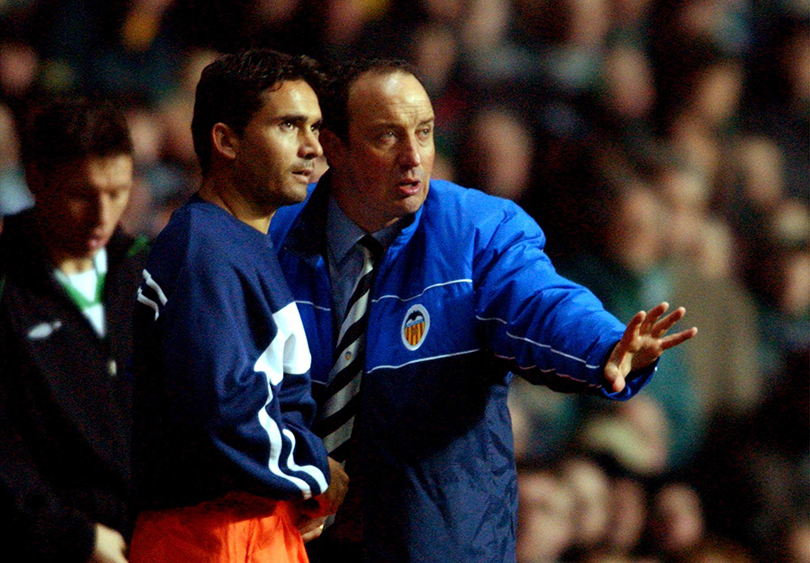
Valencia did much of their spending before Rafael Benitez was appointed as manager in the summer of 2001. In fact, they only shelled out for Atletico Madrid striker Salva Ballesta, as Benitez set about methodically transforming the Champions League finalists.
In the end, Valencia’s Liga triumph was characterised more by a mean defence than a devastating attack – they conceded only 29 goals thanks to a solid core that featured Santiago Canizares in goal, and Mauricio Pellegrino and Roberto Ayala at the heart of defence. Their top league goalscorer was Ruben Baraja, with seven.
Valencia’s triumph was made all the more impressive by the fact that they didn’t even sign a direct replacement for Gaizka Mendieta, who was sold to Lazio in one of the summer’s most high-profile transfers. Benitez made the important tactical tweak of switching from a 4-4-2 diamond to a more compact 4-2-3-1, with two defensive midfielders allowing Valencia to maintain a control in the middle of the park.
Rafa’s tactical acumen, combined with the twinkling form of Pablo Aimar – who must have grown sick of reading the constant comparisons between himself and Diego Maradona – helped land Valencia the title, and established the young coach as one of the most forward-thinking minds in football.
6. AC Milan (2003)
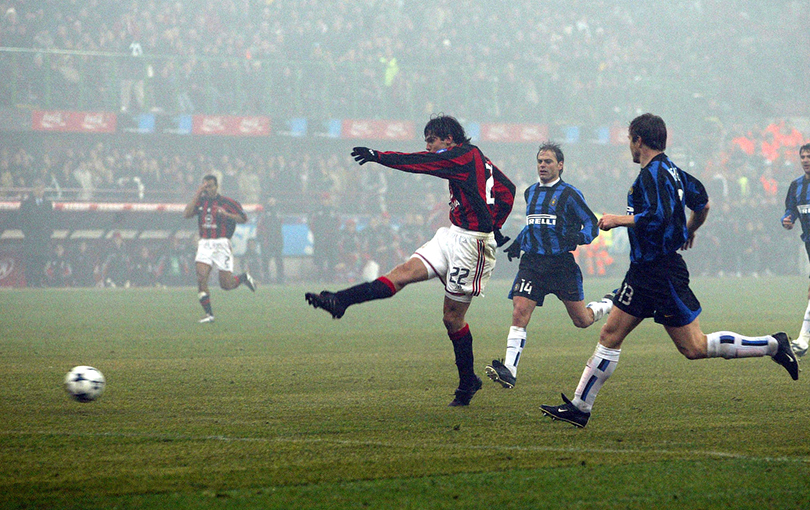
The Rossoneri, under the skilful tutelage of Carlo Ancelotti, signed Kaka from Sao Paulo and Nicola Pozzi from Cesena, while veteran Brazilian Cafu arrived on a free from Roma.
Ancelotti had just won the Champions League and felt satisfied with what he had. Adding Cafu completed a formidable defensive line-up that included Alessandro Costacurta, Alessandro Nesta and Paolo Maldini, while Kaka was an exhilarating creative spark and eventually named Serie A Footballer of the Year in his first season.
Milan were dominant again in Italy, finishing 11 points above Roma after losing only two games all season.
7. Barcelona (2015)
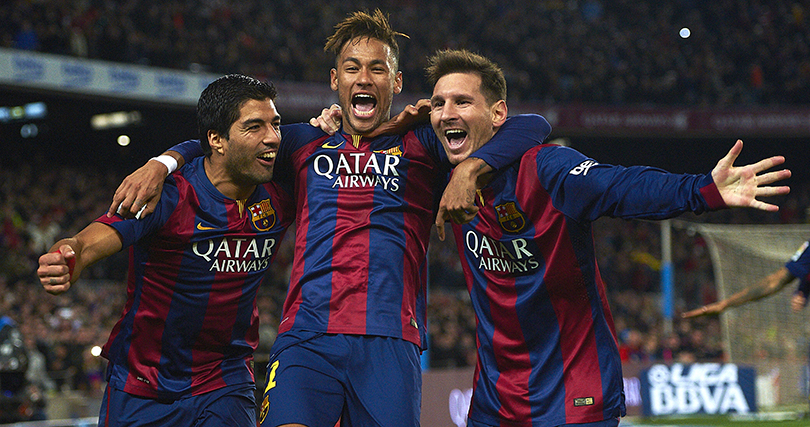
It must be nice heading into a transfer window with easily the best squad in world football. But that was Barcelona’s fortunate situation after Luis Enrique had guided the club to a superb treble in his first season.
Luis Suarez had proved to be a bargain at £65m during the 2014/15 season, combining with Lionel Messi and Neymar to such devastating effect that the trident are now considered the greatest attack force in history. Add to that a formidable defence led by Gerard Pique, plus a midfield featuring Andres Iniesta, Xavi and Sergio Busquets, and it’s hardly surprising that Enrique didn’t feel much like improving.
Arda Turan and Aleix Vidal were both signed, but neither could play until January because of a transfer ban. In fact, their biggest transfer coup arguably came in convincing right-back Dani Alves to stay at the club for another year.
Real Madrid spent £50m on Danilo and Mateo Kovacic, but it mattered little in the end as Barça retained their league crown and added another Copa del Rey to the trophy cabinet. It wasn’t dissimilar to the summer of 2005, when the Blaugrana only signed Mark van Bommel and Santiago Ezquerro but still went on to win a Liga and Champions League double under Frank Rijkaard.
8. Werder Bremen (2003)
Bremen clinched their first Bundesliga title since 1993 in 2003/04 – and owed much of it to their Euro-pinching strategy and the successful partnership of general manager Klaus Allofs and boss Thomas Schaaf. They revelled in being the underdogs to Bayern Munich, upsetting the odds to capture their first-ever league and cup double.
Their business before a glorious march to supremacy was almost non-existent. Valerien Ismael and Pekka Lagerblom cost less than £1m combined, as Schaaf focused more on implementing a playing philosophy which centred on short, quick passing movements.
Brilliant performances on the pitch betrayed rumblings of discontent off it, though. Striker Ailton, whose 28 goals lifted the club to glory, was preparing for his departure after claiming the Intertoto Cup was a waste of time, while Mladen Krstajic was on his way out and Krisztian Lisztes had handed in a transfer request.
Old order was restored the following season when Bayern romped to the title, but it was difficult to feel the same sense of admiration.
9. Manchester United (1995)
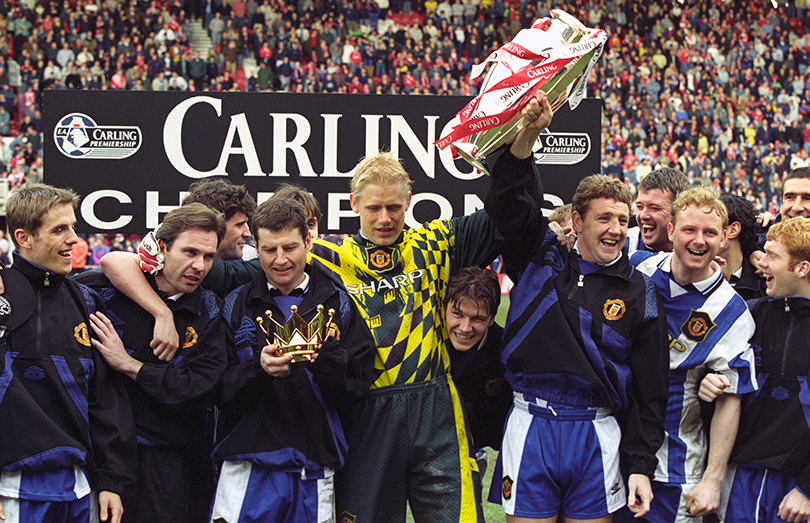
In the summer of 1995, Alex Ferguson made the daring move of breaking up a squad that had won the first two Premier Leagues; out went Paul Ince, Andrei Kanchelskis and Mark Hughes. Instead of reinvesting in major signings, however, the Scot opted to draft in United's promising crop of youth talent – that revered Class of '92 which gave us David Beckham, the Nevilles, Ryan Giggs, Paul Scholes and Nicky Butt.
Eric Cantona returned from his eight-month suspension for kung-fu kicking a Crystal Palace fan, meanwhile, which to Ferguson felt like a new arrival in itself. The Frenchman enjoyed one of his finest campaigns, scoring 19 goals in all competitions as he clinched the FWA Player of the Year award.
Ferguson’s youthful side delivered an emphatic middle finger to their detractors – who sharpened their knives when United lost 3-1 to Aston Villa on the opening day of the season – and captured a superb league and cup double. It doesn't matter what era of football it was: to lose influential players like Ince, Kanchelskis and Hughes and replace them with academy prospects was a masterstroke.
10. Bayern Munich (2005)
A team usually associated with spending sizeable sums of money to get the players they want, Bayern were a more modest financial force back in 2005. Valerien Ismael and Julio dos Santos were signed, but Bayern knew they already had the talent elsewhere to deliver a domestic campaign that included league and cup success.
Felix Magath, before becoming a dairy-based laughing stock in England, had constructed a fine Bayern team that wrestled the German crown off Bremen and re-established the Bavarians’ status as a pre-eminent European force. And he did it on a modest budget, too. Magath’s emphasis on physical fitness allowed Bayern to overpower their opponents; they played a powerful and speedy brand of football, and he was hailed as “the super-brain of the Bundesliga”.
Magath wasn’t all that smart when it came to connecting with his players, but his ability to overcome Bayern’s disastrous transfer policy and win back-to-back Bundesliga titles was hugely impressive – especially when you consider the riches bestowed on his successors.
Subscribe to FourFourTwo today! Guarantee the finest football stories and interviews dropping on your doorstep first every month.
NOW READ
LIST 12 of the most shocking player vs fan punch-ups
FANTASY PREMIER LEAGUE FourFourTwo writers reveal their FPL teams
ARSENAL It's not the defeats that are worrying for Arsenal – it's the total lack of creativity

